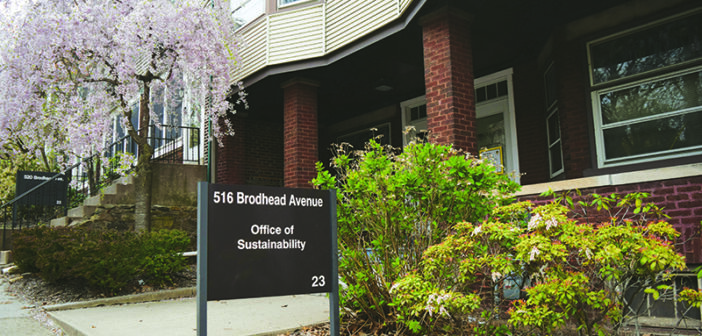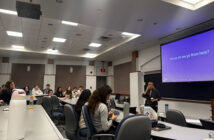Comprised of staff from Lehigh Dining, the Office of Sustainability, Student Auxiliary Services and Purchasing Services, the Campus Food Systems (CFS) working group released a draft of its Sustainable and Healthful Food Purchasing Policy earlier this week for a two week campus review period.
Through the implementation of this policy, the university will transition from carrying out its traditional food system to one that will increase both the amount of local food purchased and the amount of organic and humane food available on campus.
Since April 1, the draft has been available for public review, continuing through the 15th—a process that executive director of Student Auxiliary Services, David Joseph, described as being a standard procedure for the development of campus policy of such magnitude.
While the Sustainable and Healthful Food Purchasing Policy is its own entity, it serves as a branch of the recently released Sustainability Strategic Plan 2030, and acts as a continuation of the recently accomplished Real Food Challenge, where Lehigh aimed to purchase at least 20 percent of its food annually from community-based, fair, ecologically sound and humane sources by 2020.
“The working group formed a number of years ago with the Real Food Challenge that Lehigh participated in,” said Katharine Targett Gross, Lehigh’s sustainability officer. “Once we reached that goal, we didn’t want to stop there. We decided that we wanted to take it a step further and develop the Sustainable and Healthful Food Purchasing Policy to continue to advance solutions that support sustainable change in Lehigh’s food system.”
According to Targett Gross, the drafting of this policy began in fall 2020 after sending out three different campus surveys to current and incoming students, faculty and staff in the preceding spring.
The surveys were created to gain information about the campus body’s preferences and trends in terms of food quality and selection.
“We got an abundance of responses right away which made us realize how significant this policy is to the Lehigh community and how much everyone had an opinion about it,” said Lauren Sleeger, director of Rathbone dining hall.
To further their efforts, the CFS working group pursued stakeholder engagement through a number of focus group sessions aimed at gathering additional information beyond what was taken from the surveys.
As the CFS working group continued to meet, they looked through the data from both the surveys and focus groups and began to draft the Sustainable and Healthful Food Purchasing Policy based on feedback from the campus community and examples seen at other institutions.
“We really wanted to hear from the campus community about what they like about the policy— if there’s anything that they would change before we finalize it,” Targett Gross said.
Gabby Alves, ‘22, sees this policy as a step in the right direction. Alves is currently working on a capstone project with a company focused on the importance of eating foods that are both healthy and sustainable.
“I think Lehigh’s new policy on healthier, sustainable foods is a great idea,” Alves said. “By sourcing locally, not only are we getting healthier foods put into our bodies, but we’re helping local businesses and playing a part in giving back to the community. Eating more sustainably is something we can all do to help our environment, and I love that Lehigh is taking this step.”
In addition to purchasing healthier and more sustainable foods, with this new policy, the university will incorporate meal choices on campus that reflect cultural diversity and inclusion to accommodate all Lehigh students, faculty and staff.
By doing so, the university will avoid purchasing foods that may negatively impact marginalized and lower-income communities.
According to Targett Gross, the CFS working group is aiming to incorporate the campus feedback and complete the policy by July 1, expecting campus rollout to begin in August when students return.
“This policy is something that we can all be very proud of,” Sleeger said. “Lehigh University will rarely sit back and wait for other universities or bodies to tell us how to run things. We’re change agents.”






Comment policy
Comments posted to The Brown and White website are reviewed by a moderator before being approved. Incendiary speech or harassing language, including comments targeted at individuals, may be deemed unacceptable and not published. Spam and other soliciting will also be declined.
The Brown and White also reserves the right to not publish entirely anonymous comments.
1 Comment
The Office of Sustainability – good to have such expertise on campus but don’t complain to loudly about the increase in tuition caused by the increase in services that are adjuncts to the university.